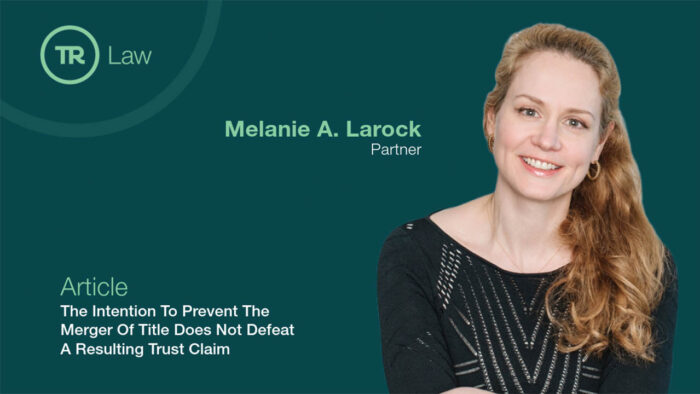Lump Sum CPP Disability Benefits Does the Insurer Get Credit?
Author(s): Leonard H. Kunka
December 4, 2012
A recent FSCO decision of Arbitrator Wilson provides an answer to the question of whether an insurer gets credit against Income Replacement benefits, for a lump sum CPP Disability payment received long after an accident.
The insured, Leroy Pries applied for and received accident benefits, (and in particular the IRB benefit) from Economical Mutual Insurance Company following a motor vehicle accident of September 3, 2007.
Mr. Pries applied for a CPP Disability benefit and was notified on March 3, 2010 that he was accepted for the benefit retroactive to November 23, 2008 (i.e. 2 years prior to the date of application and continuing). Mr. Pries duly notified Economical of the receipt of this benefit. Economical then sought to recover repayment of the IRB benefits paid to Mr. Pries on the basis of an overpayment resulting from the receipt of the lump sum CPP benefit from 2008 through 2010.
There was no dispute that CPP payments are normally deductible from IRB payments made by an insurer. Similarly, when appropriate notice has been given, there was no dispute that the SABS create a right in an insurer to demand repayment of benefits which have been overpaid.
Interestingly, the decision in the case turned on the interpretation of s. 47(3) of the SABS which reads:
“The obligation to repay a benefit does not apply unless the notice under subsection (2) is given within 12 months after the payment was made.”
Economical interpreted this section to mean that they had to give notice of their intention to seek a repayment within 12 months of being advised that the CPP benefit was received. The insured, on the other hand, argued the 12 month notice period starts from the date that payment of the benefit to be repaid was paid (i.e. 12 months from the date when the IRB benefit was paid).
Arbitrator Wilson acknowledged that the wording of the SABS creates confusion.
He stated:
“Given that the Schedule in its various iterations wins no prizes for clarity and elegance in legislative drafting, it is not surprising that the parties have had some difficulty in agreeing on the meaning of “payment” in this section.”
Arbitrator Wilson engaged in a comprehensive review of the arguments relating to grammatical and legislative interpretation, as well as prior arbitration decisions in which the term “payment” in s. 47(3) was interpreted to mean the payment of the accident benefit and not the collateral benefit. The Arbitrator even considered the French version of this SABS section to help determine its meaning. Arbitrator Wilson held that Economical could not claim repayment of income replacement benefits prior to the Notice of Repayment, given on April 27, 2010. The Arbitrator further found that Economical could deduct CPP benefits from the IRB benefit, on a going-forward basis from the date of notice.
Arbitrator Wilson indicated this was a fair result, because the insurer could, at an earlier date, have requested the insured to apply for CPP Disability benefits, and advised the insured that if CPP Disability was received, it would be seeking a reimbursement. This is typically what insurers do.
It is interesting to note that Arbitrator Wilson believes the revised version of the 2010 SABS has rectified this problem. However, a more careful analysis of the new wording would suggest the same argument which existed in the Pries and Economical case. The latest version of s. 47(3) reads:
(3) If the notice required under subsection (2) is not given within 12 months after the payment of the amount that is to be repaid, the person to whom the notice would have been given ceases to be liable to repay the amount unless it was originally paid to the person as a result of willful misrepresentation or fraud.
It is arguable that the new wording does not solve the problem. Section 47(1)(c) which creates in the insurer the right to seek repayment of an income replacement benefit which was overpaid (due to receipt of some collateral benefit), creates a right in the insurer to seek repayment of the IRB…”to the extent of any payments received by the person that are deductible from those benefits under this Regulation.” As a result, the insurer is entitled to repayment of the accident benefit paid (in this case the IRB) not to the repayment of the collateral benefit received.
If that interpretation is correct, then the phrase “the payment of the amount that is to be repaid” within section 47(3) has to be read within the context of s. 47(1)(c). “The amount which is to be repaid” under s. 47(1)(c) is the IRB benefit, not the CPP benefit. Consequently, it is still arguable, when s. 47(3) refers to “payment of the amount which is to be repaid”, it can only be referencing the IRB benefit. Therefore, the 12 month period would run from the date of payment of the IRB benefit which the insurer seeks to recover, not the date of payment of the collateral benefit.
For further inquiries on this article, please contact the author:
Leonard H. Kunka
[email protected]
or visit his web page at: www.thomsonrogers.com/ leonard-kunka
The material in this newsletter is provided for the information of our readers and is not intended nor should it be considered legal advice.
Share this








